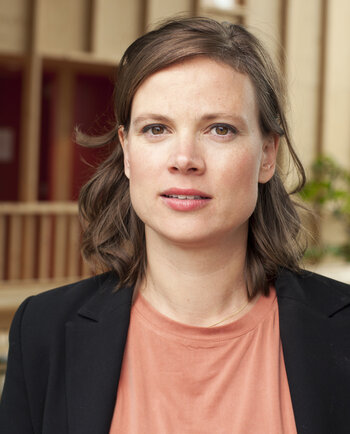
Moving cities and connecting academia to societal challenges
Simone van de Wetering Adviseur en onderzoeker sociale innovatieFor three sunny days in June, the Jagiellonian University in Krakow hosted the European Research Network’s Moving Cities Conference++SubjectsKeynote speakers Talja Blokland and Saskia Sassen, amongst others, spoke about changing concepts of community and globalising cities. Click here for more details on the programme.. Here, academics, designers, architects, civil servants and independent researchers presented their work in the broad field of urban sociology. The diversity of speakers illustrated how people from various disciplines work on the same themes: segregation, social and spatial exclusion, gentrification, citizen’s political participation, public spaces as places of contestation and so on. Their presentations did not only show that they work on the same topics, but also that they do so driven by the same aim: wanting to make a change. At the same time, being together in this diversity of disciplines revealed the limits of academia in making that change, and underlined the need to connect academic work to societal challenges.
How citizens make their cities move
At the Krakow conference, discussing ‘moving cities’ meant discussing how citizens make their cities move. A variety of urban residents’ initiatives were presented: from urban gardening as a form of social activism to evoke bottom-up processes of social change in the city, to a school bus network and a neighbourhood water-distributing organisation as citizens’ responses to a retreated municipality in Detroit. A central question in relation to these initiatives is: why now? What circumstances make that we see citizen’s initiatives popping up in the city one after the other? The answer given: because it is this bad. We have reached the point where retreated municipal institutions fail to take care of their cities, and citizens see no other option than to take responsibility for their city’s governance themselves.
TheAt the Krakow conference, discussing ‘moving cities’ meant discussing how citizens make their cities move. failure of Detroit to provide in the basic needs of its citizens is explained by the city filing bankruptcy in July 2013. But, as a result of state decentralisations++Dutch perspectiveRead colleague Thijs’ perspective on the consequences of decentralisations for citizens and policymaking in this article (in Dutch)., also cities here in the Netherlands expect more and more of their citizens and their initiatives to move, build, and make their city. The challenge is to connect these citizens’ initiatives to ways of making structural change. Citizens do a lot of citymaking++KL & citymakingWhich innovative ideas exist in our cities? And how do we make sure that these ideas have the opportunity to develop? Read more here., but the question is how we make their initiatives last. Bottom-up citymaking is not (necessarily) durable policy-making and pop-up initiatives do not guarantee the change of urban structures. How do experimental grassroots projects relate to public policy in creating systemic change? How do they get picked up, taken over and implemented? To make citizen’s citymaking not only shake up but truly move their cities, we need more than identifying, analysing and describing interesting initiatives. It asks us to connect with the stakeholders involved: from citizens to policy-makers, designers, architects and also academics.
Translating academic research into social change
AsCitizens do a lot of citymaking, but the question is how we make their initiatives last. citymaking is not equivalent to durable policy-making, analysing and describing decision-making processes does not mean influencing or changing these processes of urban change. To take an example: the topic of gentrification++GentrificationFrom analysing and describing urban processes of gentrification, to analysing and describing ways to influence them. Read more in this article. was elaborately discussed in various presentations during the conference. In a conversation on one of these presentations a young PhD student articulated a profound discontent with the work on this topic. He was clueless about what our knowledge of gentrification was worth: what do we do with the knowledge that academics develop? Passionate and lively discussions are held at conferences and within universities, and more and more academics do articulate their informed opinions in the public debate++ExampleFor instance, ‘Niemandsland’ (‘Limbo’) is an interesting platform, initiated by professors, academic teachers and PhD students with short columns on societal issues. ‘A place to ask questions, be astound, curious and in doubt’.. But academics who also engage with and work on societal challenges outside the walls of academia are still scarce. Some work comfortably within the ivory tower, others are too limited in their time and resources to use their knowledge to tackle social issues. Social scientists are overall still seen as those who educate people, as academics who are there to understand the elusive, to describe and to analyse the complexity of social reality. But, as one bright professor bluntly stated in his reflection on the conference:
“Academia in itself has no power.”
If academics are driven by wanting to make a change, they should not be limited to describing social processes but act against the things they disagree with, commit themselves to the things they find important. If academics analyse and describe a disconnect between citizens’ initiativesIf academics are driven by wanting to make a change, they should not be limited to describing social processes but act against the things they disagree with, commit themselves to the things they find important. and urban change, they should also (be able to) engage with the processes to make that better. The social scientist’s role is to be critical, but also to engage with other experts like citizens, municipal workers, social designers and architects. Academia does have power when research can be translated into social change: when academic knowledge is applied to the challenges of society. Then it has a very powerful contribution to offer. By connecting academia++Academic innovationRead more on Kennisland and academic innovation here. to multidisciplinary society we can move academics from solely writing articles and books to putting analyses into action and making change. With more and more empirical research and increasing collaborative projects with other disciplines the social sciences are moving in the right direction. But they need to radicalise to break out of the current limiting academic system and to move from analysis and description to work on the change they say to be driven by.

